#*climate change
Explore tagged Tumblr posts
Text
Hey
Hey Americans.
The federal government is about to get useless for at least a bit. This is a GREAT time to get involved in state level environmental orgs. That's where you're gonna be able to do the most for the next few years. Even a bit of casual volunteering can make a big difference.
I've done this off and on for years and when we go local we WIN. And friends winning feels good. This is how a lot of progressive agendas have won in this country. The whole US isn't out of this. People ARE still fighting climate change all around you.
You could be one of those people, in community with other people who are doing something.
doom and gloom "oooh everything is pointless oooh I'm so deep and edgy because I love trying to be the death of hope" people will just get blocked. I'm not talking to your crab-bucket ass.
3K notes
·
View notes
Text
Oh no

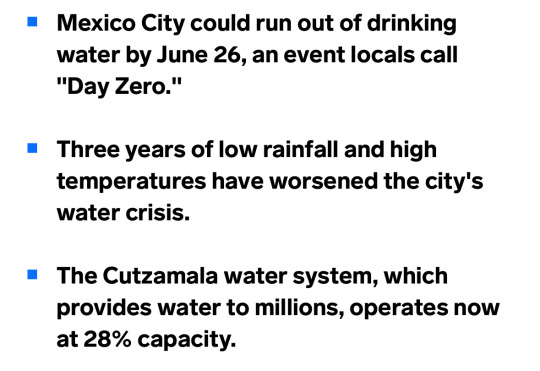
Source
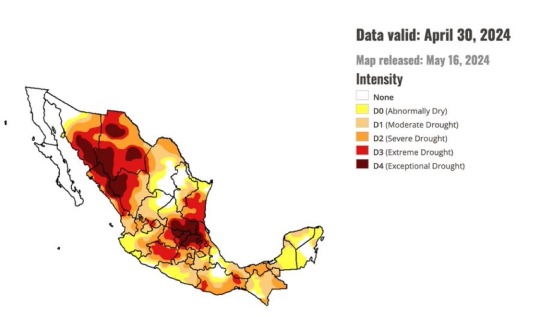
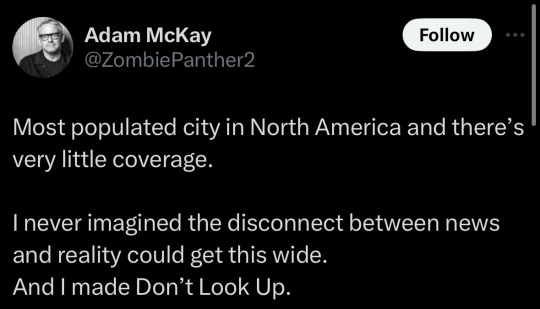
Source
#environment#Mexico#news#climate change#government#the left#progressive#twitter post#activism#current events#drought#environmentalism
28K notes
·
View notes
Text
From the article:
Colombia has launched a new $40-million investment plan for its energy transition, aiming to move away from oil and gas production, partly through pursuing green economic opportunities in sustainable tourism and nature restoration.
#good news#sustainability#green energy#hope#hopepunk#climate change#global warming#environment#conservation#biodiversity#nature#colombia
150 notes
·
View notes
Photo

The Climate Change Performance Index 2025. Denmark, Netherlands, UK, Philippines, and Morocco top the list, although no country is ranked in top 3.
98 notes
·
View notes
Text

Flood warnings and alerts across England right now- I hope everyone is able to stay safe and in their homes.
But don't let anyone tell you this is normal! It's a predicatable impact of climate change, but it isn't normal.
75 notes
·
View notes
Text
The Alberta government is proposing additional restrictions on wind and solar farms that conservationists think are more about limiting renewable energy than protecting the environment. Last year the Alberta government imposed a seven-month moratorium on new renewable energy projects, after which Premier Danielle Smith announced her government would be taking an “agriculture first” approach to regulating renewable energy project locations. That approach includes preventing renewable energy projects from being within 35 kilometres of “pristine viewscapes” and parks and protected areas, and a near total ban where soil conditions are prime for yielding crops. “We need to ensure that we’re not sacrificing our future agricultural yields, or tourism dollars, or breathtaking viewscapes to rush renewables developments,” Smith said at the time.
Continue Reading
Tagging: @newsfromstolenland, @abpoli
#danielle smith#renewable energy#climate change#agriculture#alberta#cdnpoli#canadian politics#canadian news#canada
62 notes
·
View notes
Text
INaturalist is a great tool to use to begin learning to ID things, also, if your IDs are considered 'research grade' it allows scientist to use it in their research. It is a great tool that can have a big impact.
Planet's Fucked: What Can You Do To Help? (Long Post)
Since nobody is talking about the existential threat to the climate and the environment a second Trump term/Republican government control will cause, which to me supersedes literally every other issue, I wanted to just say my two cents, and some things you can do to help. I am a conservation biologist, whose field was hit substantially by the first Trump presidency. I study wild bees, birds, and plants.
In case anyone forgot what he did last time, he gagged scientists' ability to talk about climate change, he tried zeroing budgets for agencies like the NOAA, he attempted to gut protections in the Endangered Species Act (mainly by redefining 'take' in a way that would allow corporations to destroy habitat of imperiled species with no ramifications), he tried to do the same for the Migratory Bird Treaty Act (the law that offers official protection for native non-game birds), he sought to expand oil and coal extraction from federal protected lands, he shrunk the size of multiple national preserves, HE PULLED US OUT OF THE PARIS CLIMATE AGREEMENT, and more.
We are at a crucial tipping point in being able to slow the pace of climate change, where we decide what emissions scenario we will operate at, with existential consequences for both the environment and people. We are also in the middle of the Sixth Mass Extinction, with the rate of species extinctions far surpassing background rates due completely to human actions. What we do now will determine the fate of the environment for hundreds or thousands of years - from our ability to grow key food crops (goodbye corn belt! I hated you anyway but), to the pressure on coastal communities that will face the brunt of sea level rise and intensifying extreme weather events, to desertification, ocean acidification, wildfires, melting permafrost (yay, outbreaks of deadly frozen viruses!), and a breaking down of ecosystems and ecosystem services due to continued habitat loss and species declines, especially insect declines. The fact that the environment is clearly a low priority issue despite the very real existential threat to so many people, is beyond my ability to understand. I do partly blame the public education system for offering no mandatory environmental science curriculum or any at all in most places. What it means is that it will take the support of everyone who does care to make any amount of difference in this steeply uphill battle.
There are not enough environmental scientists to solve these issues, not if public support is not on our side and the majority of the general public is either uninformed or actively hostile towards climate science (or any conservation science).
So what can you, my fellow Americans, do to help mitigate and minimize the inevitable damage that lay ahead?
I'm not going to tell you to recycle more or take shorter showers. I'll be honest, that stuff is a drop in the bucket. What does matter on the individual level is restoring and protecting habitat, reducing threats to at-risk species, reducing pesticide use, improving agricultural practices, and pushing for policy changes. Restoring CONNECTIVITY to our landscape - corridors of contiguous habitat - will make all the difference for wildlife to be able to survive a changing climate and continued human population expansion.
**Caveat that I work in the northeast with pollinators and birds so I cannot provide specific organizations for some topics, including climate change focused NGOs. Scientists on tumblr who specialize in other fields, please add your own recommended resources. **
We need two things: FUNDING and MANPOWER.
You may surprised to find that an insane amount of conservation work is carried out by volunteers. We don't ever have the funds to pay most of the people who want to help. If you really really care, consider going into a conservation-related field as a career. It's rewarding, passionate work.
At the national level, please support:
The Nature Conservancy
Xerces Society for Invertebrate Conservation
Cornell Lab of Ornithology (including eBird)
National Audubon Society
Federal Duck Stamps (you don't need to be a hunter to buy one!)
These first four work to acquire and restore critical habitat, change environmental policy, and educate the public. There is almost certainly a Nature Conservancy-owned property within driving distance of you. Xerces plays a very large role in pollinator conservation, including sustainable agriculture, native bee monitoring programs, and the Bee City/Bee Campus USA programs. The Lab of O is one of the world's leaders in bird research and conservation. Audubon focuses on bird conservation. You can get annual memberships to these organizations and receive cool swag and/or a subscription to their publications which are well worth it. You can also volunteer your time; we need thousands of volunteers to do everything from conducting wildlife surveys, invasive species removal, providing outreach programming, managing habitat/clearing trails, planting trees, you name it. Federal Duck Stamps are the major revenue for wetland conservation; hunters need to buy them to hunt waterfowl but anyone can get them to collect!
THERE ARE DEFINITELY MORE, but these are a start.
Additionally, any federal or local organizations that seek to provide support and relief to those affected by hurricanes, sea level rise, any form of coastal climate change...
At the regional level:
These are a list of topics that affect major regions of the United States. Since I do not work in most of these areas I don't feel confident recommending specific organizations, but please seek resources relating to these as they are likely major conservation issues near you.
PRAIRIE CONSERVATION & PRAIRIE POTHOLE WETLANDS
DRYING OF THE COLORADO RIVER (good overview video linked)
PROTECTION OF ESTUARIES AND SALTMARSH, ESPECIALLY IN THE DELAWARE BAY AND LONG ISLAND (and mangroves further south, everglades etc; this includes restoring LIVING SHORELINES instead of concrete storm walls; also check out the likely-soon extinction of saltmarsh sparrows)
UNDAMMING MAJOR RIVERS (not just the Colorado; restoring salmon runs, restoring historic floodplains)
NATIVE POLLINATOR DECLINES (NOT honeybees. for fuck's sake. honeybees are non-native domesticated animals. don't you DARE get honeybee hives to 'save the bees')
WILDLIFE ALONG THE SOUTHERN BORDER (support the Mission Butterfly Center!)
INVASIVE PLANT AND ANIMAL SPECIES (this is everywhere but the specifics will differ regionally, dear lord please help Hawaii)
LOSS OF WETLANDS NATIONWIDE (some states have lost over 90% of their wetlands, I'm looking at you California, Ohio, Illinois)
INDUSTRIAL AGRICULTURE, esp in the CORN BELT and CALIFORNIA - this is an issue much bigger than each of us, but we can work incrementally to promote sustainable practices and create habitat in farmland-dominated areas. Support small, local farms, especially those that use soil regenerative practices, no-till agriculture, no pesticides/Integrated Pest Management/no neonicotinoids/at least non-persistent pesticides. We need more farmers enrolling in NRCS programs to put farmland in temporary or permanent wetland easements, or to rent the land for a 30-year solar farm cycle. We've lost over 99% of our prairies to corn and soybeans. Let's not make it 100%.
INDIGENOUS LAND-BACK EFFORTS/INDIGENOUS LAND MANAGEMENT/TEK (adding this because there have been increasing efforts not just for reparations but to also allow indigenous communities to steward and manage lands either fully independently or alongside western science, and it would have great benefits for both people and the land; I know others on here could speak much more on this. Please platform indigenous voices)
HARMFUL ALGAL BLOOMS (get your neighbors to stop dumping fertilizers on their lawn next to lakes, reduce agricultural runoff)
OCEAN PLASTIC (it's not straws, it's mostly commercial fishing line/trawling equipment and microplastics)
A lot of these are interconnected. And of course not a complete list.
At the state and local level:
You probably have the most power to make change at the local level!
Support or volunteer at your local nature centers, local/state land conservancy non-profits (find out who owns&manages the preserves you like to hike at!), state fish & game dept/non-game program, local Audubon chapters (they do a LOT). Participate in a Christmas Bird Count!
Join local garden clubs, which install and maintain town plantings - encourage them to use NATIVE plants. Join a community garden!
Get your college campus or city/town certified in the Bee Campus USA/Bee City USA programs from the Xerces Society
Check out your state's official plant nursery, forest society, natural heritage program, anything that you could become a member of, get plants from, or volunteer at.
Volunteer to be part of your town's conservation commission, which makes decisions about land management and funding
Attend classes or volunteer with your land grant university's cooperative extension (including master gardener programs)
Literally any volunteer effort aimed at improving the local environment, whether that's picking up litter, pulling invasive plants, installing a local garden, planting trees in a city park, ANYTHING. make a positive change in your own sphere. learn the local issues affecting your nearby ecosystems. I guarantee some lake or river nearby is polluted
MAKE HABITAT IN YOUR COMMUNITY. Biggest thing you can do. Use plants native to your area in your yard or garden. Ditch your lawn. Don't use pesticides (including mosquito spraying, tick spraying, Roundup, etc). Don't use fertilizers that will run off into drinking water. Leave the leaves in your yard. Get your school/college to plant native gardens. Plant native trees (most trees planted in yards are not native). Remove invasive plants in your yard.
On this last point, HERE ARE EASY ONLINE RESOURCES TO FIND NATIVE PLANTS and LEARN ABOUT NATIVE GARDENING:
Xerces Society Pollinator Conservation Resource Center
Pollinator Pathway
Audubon Native Plant Finder
Homegrown National Park (and Doug Tallamy's other books)
National Wildlife Federation Native Plant Finder (clunky but somewhat helpful)
Heather Holm (for prairie/midwest/northeast)
MonarchGard w/ Benjamin Vogt (for prairie/midwest)
Native Plant Trust (northeast & mid-atlantic)
Grow Native Massachusetts (northeast)
Habitat Gardening in Central New York (northeast)
There are many more - I'm not familiar with resources for western states. Print books are your biggest friend. Happy to provide a list of those.
Lastly, you can help scientists monitor species using citizen science. Contribute to iNaturalist, eBird, Bumblebee Watch, or any number of more geographically or taxonomically targeted programs (for instance, our state has a butterfly census carried out by citizen volunteers).
In short? Get curious, get educated, get involved. Notice your local nature, find out how it's threatened, and find out who's working to protect it that you can help with. The health of the planet, including our resilience to climate change, is determined by small local efforts to maintain and restore habitat. That is how we survive this. When government funding won't come, when we're beat back at every turn trying to get policy changed, it comes down to each individual person creating a safe refuge for nature.
Thanks for reading this far. Please feel free to add your own credible resources and organizations.
16K notes
·
View notes
Text




I had this pair of work pants that were there for me in all my habitat restoration/sustainable ag/conservation/dirty boots jobs. But they had a huge tear in the seat that I could only repair so many times, but I didn't wanna let go of them. So I just turned them into this portfolio for my climate desk jobs. Now they're still forwarding climate badassery beside me (holding my to do lists)
36 notes
·
View notes
Text
instagram
#socialism#communism#democrats#new world order#climate change#republicans#wef#biden#trump#nwo#kamala harris#Instagram
24 notes
·
View notes
Text
In October, I saw the lilac bush started to bloom in places where the buds hadn't fully flowered during it's actual season: May and June. I saw this for two different bushes 45 minutes apart.
A hedge of rose bushes were in full red bloom on Halloween.
I live near Philadelphia these days but grew up in the Boston area like OP. I haven't seen a proper snow in 15 years and assumed it was because of the move at first. I was in NJ and we laughed that we brought the weather with us. The kind of proper snow that leaves walls of the stuff at the edges of roads; piles in the middle of cleaned up parking lots for weeks on end or until spring melts it away to help quench the plants. We've had storms here and there since, but it's all slush by the next day or two.
I'll hear about a dusting of snow but it'll be so light that it melts under the morning and midday sun, and it's gone before I wake up in the afternoon. If we get a good snow once a winter now, it's not guaranteed.
I lament the winter clothes I brought with me, diligently, from New England. Because good winter gear, it was drilled into my head, is worth hanging onto. I have articles I've never needed since leaving my birthplace. I can't get rid of them. I know deep down I won't need them and I can't get rid of them. It feels illogical.
Snow should be normal here. The plants shouldn't be blooming like it's May.
it is november, and yesterday it felt like it was supposed to be snowing. in boston, november used a winter month, not a fall month. it is supposed to be chilly; rarely capping over 45F. it is a sweater-and-jacket month. it is a "maybe a scarf too" month. in my childhood, november meant blizzards and sleet.
it did not snow. tomorrow the weather predicts a high of 76.
i have spent so many years of my life studying the longterm possibilities of climate change - the culmination of capitalism wreaking havoc on the bodies of people, animals, plants - but every so often i am still shocked by something small and personal.
in a hundred years, when someone goes outside in boston - will they know the feeling of "snow in the air"?
i know it's a learned feeling, a sensation that maybe only longterm experience can teach. a few years ago, i was walking with my friend who had just moved up from the south. i said it smells like snow and she gave me this look like - what the fuck. i said it feels like snow too, which didn't help. she looked up to the bright blue sky and then back at me and then back at the sky. 12 hours later, we had 3 inches. you can just tell if it's going to snow.
except i can't tell, anymore. i stand outside in a tee shirt and watch my dog dance around a lake. we're in a drought and the skin of the water has peeled back twenty meters. the lake is tamed, quiet, puddlelike and sour. my pokemon go app warns there's a weather condition in my area.
my dog gets too hot from running and sits in the water and i want to laugh about his long frame and how awkwardly he sits - and i can't. some simian part of my brain is scratching the walls. it was supposed to snow. it was supposed to snow, but now it's warm instead.
during the last full solar eclipse, the dogs and the birds and the crickets went crazy under utter darkness. we laughed at them then, promising it will all be okay in a moment. but some part of me is still locked in that long night: some animal sensation.
something is wrong, my body says. i can't afford eggs or rent. i go outside to watch a sunset and listen to birdsong. i don't bring a jacket. allergies are killing me this season, allergies i didn't have as a kid. everyone comments that halloween has started to feel strange, offkilter. that it's hard having "holiday cheer." my body thinks it's april, and then it thinks we're in september, and then june.
something is terribly wrong, she whispers. go outside. it is supposed to be snowing.
14K notes
·
View notes
Text
From the article:
It’s difficult to overstate how rapidly Australians have embraced solar power, and how much it has exceeded expectations. In 2011, the forecast was that rooftop solar would eventually contribute 4 terawatt hours of electricity. In the context of the Australian grid, this was next to nothing – barely 2% of total generation. For some, it raised the question of whether it was really worth the cost. More than a decade on, that number has been eclipsed more than six times over in the five eastern states connected by the country’s main power grid. Rooftop solar panels connected to the National Electricity Market generated 24.6TWh over the last year of data. Put another way, homes have contributed 11.6% of electricity – nearly as much as wind farms, comfortably more than large-scale solar farms or hydro plants, and twice as much as gas-fired power. More than 3.7m households and small businesses have solar systems. It means more than one in three homes across the country generate their own power when the sun is out.
#good news#solar power#hope#hopepunk#solar bunk#sustainable energy#green energy#climate change#global warming#environment#climate anxiety#ecoanxiety
133 notes
·
View notes
Text
where's that "was anyone gonna tell me" meme when you need it because holy shit did the bird app just slap me in the face with this
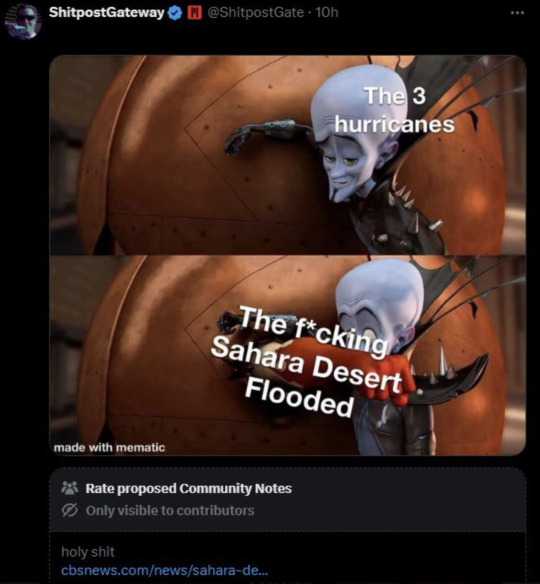
(and yes, it's real and terrifying tbh)
50K notes
·
View notes
Text
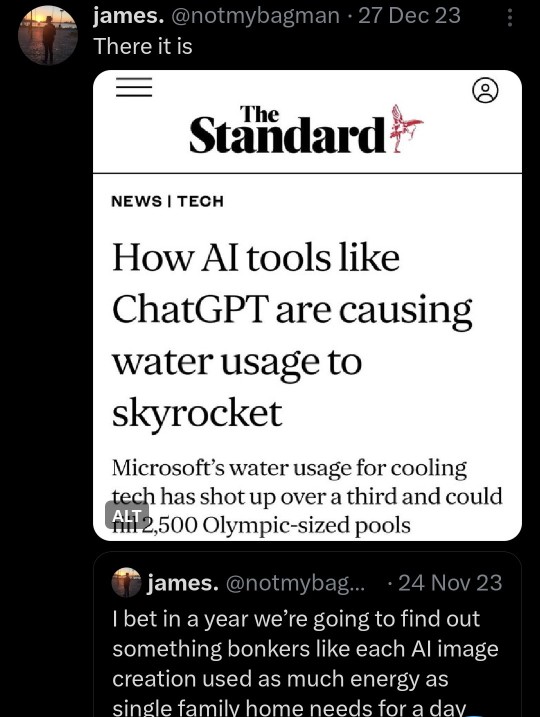
120K notes
·
View notes
Text
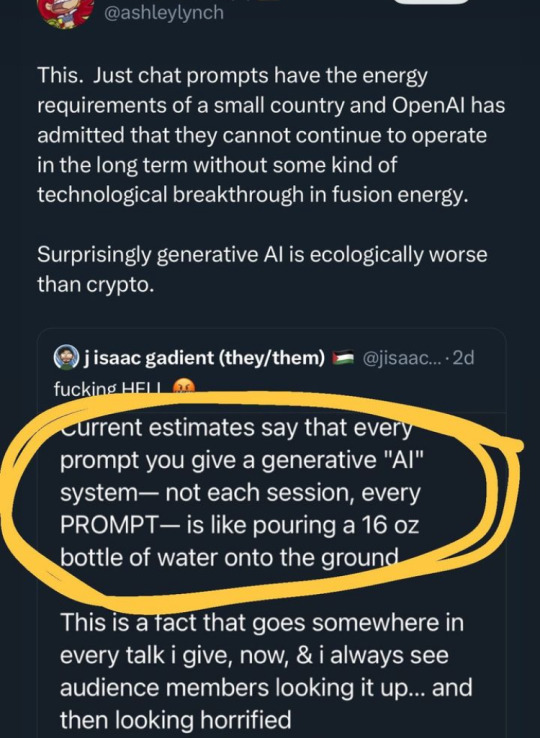
#ai#ai art#climate change#ecology#ecocide#water rights#land back#respect water treaties with First Nations#wasteland#waste#waste fraud and abuse#desertification
63K notes
·
View notes
Text
Christmas as a cultural icon is starting to get really dystopian in a climate sense, december has historically been a time of year in which there would be snow in a significant portion of europe and north america, and the fact that its not even icy this time of year and all the christmas songs and decorations reference a time of year that will likely never exist in the same way again in my life time is so strange.
#for reference i live in scotland so it is weird that there is no ice or snow in december anymore#shitpost#not really but its just how i find my original content#christmas#climate change
115K notes
·
View notes